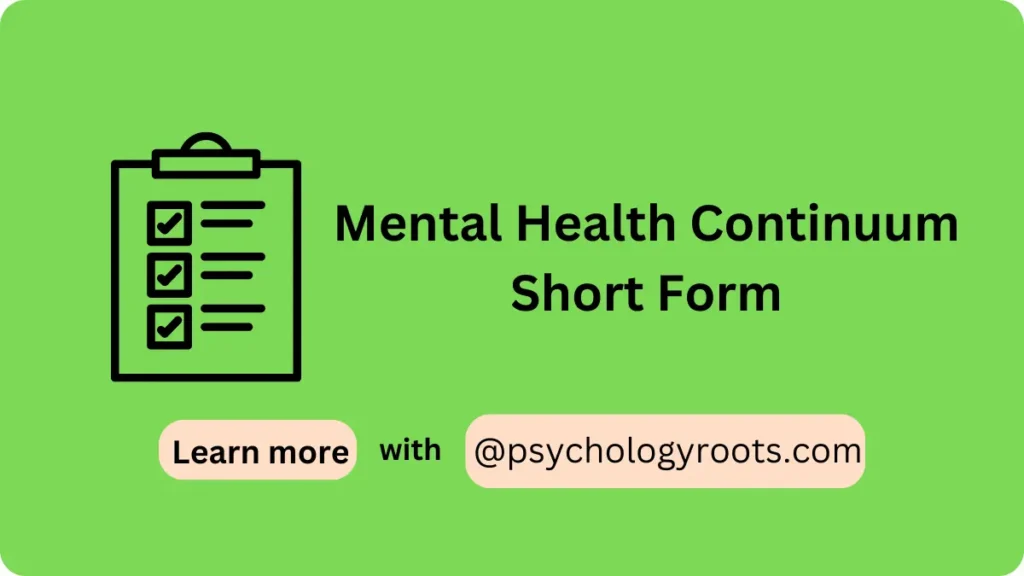Table of Contents
Mental Health Continuum Short Form
Here in this post, we are sharing the “Mental Health Continuum Short Form”. You can read psychometric and Author information. We have thousands of Scales and questionnaires in our collection (See Scales and Questionnaires). You can demand us any scale and questionnaires related to psychology through our community, and we will provide you with a short time. Keep visiting Psychology Roots.
About Mental Health Continuum Short Form
Scale Name
Mental Health Continuum Short Form
Author Details
Keyes, C.L.M
Translation Availability
Not Sure

Background/Description
Traditional approaches to mental health often categorize individuals as either having a mental illness or being mentally healthy. However, mental health isn’t a binary state. It exists on a spectrum, with varying levels of well-being. This is where the Mental Health Continuum Short Form (MHC-SF) comes in.
Developed by Dr. Corey L. Keyes, the MHC-SF is a brief, 14-item questionnaire designed to assess a person’s mental health across a spectrum. Unlike traditional methods, it focuses on positive aspects of mental well-being rather than solely on the presence of mental illness.
The Mental Health Continuum Short Form (MHC-SF) is derived from the long form (MHC-LF) which consists of 7 items measuring emotional well-being, 18 items measuring psychological well-being, and 15 items measuring social well-being (40 items total). The MHC-SF consists of 14 items that were selected to represent each fact of well-being. The short form consists of 3 emotional well-being items (reflects hedonic well-being), 6 psychological well-being items, and 5 social well-being items (when combined, reflects eudemonic well-being). These response options assess the frequency with which respondents experience each symptom of positive mental health. This scale also provides a flourishing and languishing mental health indicator based on these three subscales.
Administration, Scoring and Interpretation
- Introduction: Briefly explain the purpose of the MHC-SF, emphasizing it’s about understanding mental well-being.
- Confidentiality: Assure participants their responses are anonymous and confidential.
- Instructions: Clearly explain how to complete the questionnaire. Instruct participants to read each statement and indicate, on the provided scale, how often they’ve experienced that feeling or thought in the past month.
- Time: The MHC-SF is brief, typically taking 5-10 minutes to complete.
- Scoring: Scoring instructions are not typically included when administering the MHC-SF. This is because scoring should be done by a qualified professional who can interpret the results within the appropriate context.
Reliability and Validity
The Mental Health Continuum Short Form (MHC-SF) shows promise as a reliable and valid tool for assessing mental well-being, but it’s important to understand both its strengths and limitations.
Reliability refers to the consistency of the MHC-SF in measuring what it’s designed to measure. Research suggests the MHC-SF has good internal consistency:
- High internal consistency: Studies have found the MHC-SF subscales (emotional, psychological, social well-being) have good internal consistency, meaning the items within each subscale are measuring a similar construct.
Validity refers to whether the MHC-SF actually measures what it claims to measure. Here’s a breakdown of the MHC-SF’s validity:
- Convergent validity: The MHC-SF scores tend to correlate with scores from other well-established measures of mental well-being, suggesting it captures similar concepts.
- Discriminant validity: Studies have shown the MHC-SF has moderate correlations with measures of mental illness symptoms (like anxiety and depression), indicating it can differentiate between positive mental health and mental illness.
Limitations to Consider:
- Self-report measure: The MHC-SF relies on self-reported experiences, which can be influenced by factors like social desirability or current mood.
- Limited diagnostic value: The MHC-SF is not a diagnostic tool and shouldn’t be used to diagnose mental health conditions.
- Newer instrument: While research is ongoing, the MHC-SF is a relatively new instrument compared to some established mental health assessments. More research is needed to fully understand its strengths and limitations in diverse populations.
Available Versions
14-Items
Reference
Keyes, C. L., Wissing, M., Potgieter, J. P., Temane, M., Kruger, A., & Van Rooy, S. (2008). Evaluation of the mental health continuum–short form (MHC–SF) in setswana‐speaking South Africans. Clinical psychology & psychotherapy, 15(3), 181-192.
Lamers, S. M., Westerhof, G. J., Bohlmeijer, E. T., ten Klooster, P. M., & Keyes, C. L. (2011). Evaluating the psychometric properties of the mental health continuum‐short form (MHC‐SF). Journal of clinical psychology, 67(1), 99-110.
Important Link
Scale File:
Frequently Asked Questions
What is the MHC-SF?
A short (14-question) survey to assess mental well-being on a spectrum.
What does it measure?
Emotional, psychological, and social well-being.
How is it scored?
Scored by a qualified professional, not typically administered during the test.
Who developed it?
Dr. Corey L. Keyes.
Is it reliable?
Yes, it shows good internal consistency within its subscales.
Is it valid?
Yes, it shows convergent and discriminant validity with other mental health measures.
Limitations?
Self-reported, not a diagnostic tool, relatively new instrument.
How is it used?
Research, clinical practice, and public health to assess mental well-being.
Disclaimer
Please note that Psychology Roots does not have the right to grant permission for the use of any psychological scales or assessments listed on its website. To use any scale or assessment, you must obtain permission directly from the author or translator of the tool. Psychology Roots provides information about various tools and their administration procedures, but it is your responsibility to obtain proper permissions before using any scale or assessment. If you need further information about an author’s contact details, please submit a query to the Psychology Roots team.
Help Us Improve This Article
Have you discovered an inaccuracy? We put out great effort to give accurate and scientifically trustworthy information to our readers. Please notify us if you discover any typographical or grammatical errors.
Make a comment. We acknowledge and appreciate your efforts.
If you have any scale or any material related to psychology kindly share it with us at psychologyroots@gmail.com. We help others on behalf of you.